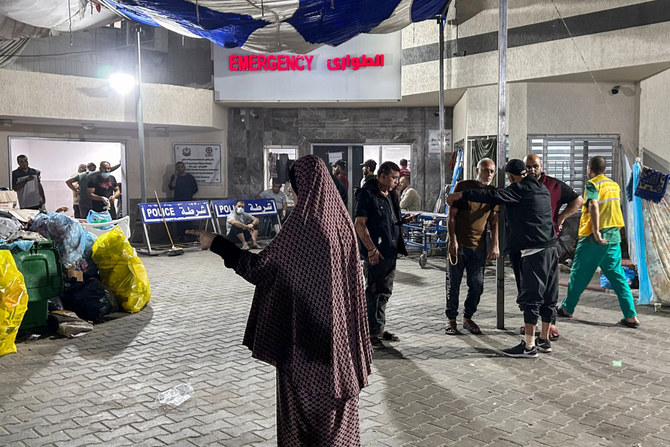ROME: The co-sponsors of a new bipartisan US sanctions package targeting Russia briefed European allies and Ukraine on the legislation Thursday, in an effort to show continued resolve to help Kyiv and force Moscow to the negotiating table through what they describe as a “game-changer” bill.
The bill backed by Republican Sen. Lindsey Graham and Democratic Sen. Richard Blumenthal calls for a 500 percent tariff on goods imported from countries that continue to buy Russian oil, gas, uranium and other exports — targeting nations like China and India, which account for roughly 70 percent of Russia’s energy trade and bankroll much of its war effort.
Graham and Blumenthal told The Associated Press in Rome that they hope to bring the legislation to a vote in the Senate before the August recess. They said Thursday they are convinced that it would give President Donald Trump the tools and flexibility he needs to force Russian President Vladimir Putin to negotiate an end to the war.
“We’re not gonna play whack-a-mole anymore with Russia and sanctions,” Graham said. “We’re going after his customer base. And that’s what the Europeans, I think, are most pleased with.”
“This is not just kind of a continuation of our current strategy. This is a real turning point,” Blumenthal added. “It’s a real game-changer because it says to Putin, ‘We’re going to hit you right where it hurts.’”
A coalition of the willing
Graham and Blumenthal briefed a meeting in Rome of the coalition of the willing, the 30-plus countries that are prepared to send troops to keep the peace in Ukraine after hostilities cease. The meeting, which the United States attended for the first time, was held on the sidelines of a Ukraine recovery conference.
Joining them was retired Lt. Gen. Keith Kellogg, Trump’s special envoy for Ukraine and Russia. The senators stressed that no US troops would be in Ukraine, but that they participated in the gathering at the invitation of host Italy to bolster the US presence at the Rome meeting and show congressional commitment to Ukraine.
“I think we gave Ukraine, the Europeans encouragement that America, the Congress was involved in a bipartisan fashion,” Graham said. “We want to empower the president to get Putin to the table and with tools he doesn’t have today.”
“Hopefully we can get this legislation to the president by the end of the month, is the goal,” he said.
A deadline before summer break
Congress is prepared to act on the legislation, which has overwhelming bipartisan support in the Senate, but has been waiting for Trump to give the green light before lawmakers recess for the summer break.
So far, the White House has expressed some reservations. Trump wants full authority over the waiver process to lift the sanctions, tariffs or other penalties, without having to cede control to Congress.
Under the initial bill, the president “may terminate” the penalties under certain circumstances, but immediately reimpose them if the violations resume. Graham said the president would be allowed to waive the sanctions, for 180 days, and could also renew a waiver.
But the president’s decision would eventually be subject to congressional review. To overturn the president’s waiver would require a vote in Congress. It would need to clear the Senate’s high-bar of a 60-vote threshold, Graham said. That is often difficult to reach in the narrowly divided chamber.
“That’s not going to happen, unless some crazy thing happens,” he said.
The senators explained that the waiver authority in their bill is standard, similar to what has been included in past legislation. But with the president’s insistence on fully waiver authority, and also Congress wanting its own backstop, the legislation continues to evolve.
A work in progress
Senate Majority Leader John Thune said this week he hopes to bring the measure forward before Congress goes on recess in August. House Speaker Mike Johnson has also signaled a readiness to act in his chamber.
While Thune said the sanctions bill has “tremendous” bipartisan support, the GOP leader acknowledged it’s still a work in progress as the White House engages with the process.
“We are working with the administration, with the House to try and get it in a form where it’s ready,” he said. Whether that happens in the next few weeks is still “a bit of an open question,” he said. “But I’m hopeful we can.”
Graham and Blumenthal said the legislation would also have a deterrent effect on China and curb its ambitions in Taiwan, with Graham saying the threat of such a massive economic hit for its support of Russia was a “trial run for Taiwan.”
“The other important lesson for China here is that a small country, out-manned and out-gunned, can win,” Blumenthal said.
























